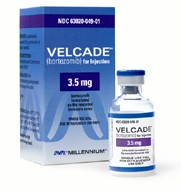
Recently Diagnosed or Relapsed? Stop Looking For a Miracle Cure, and Use Evidence-Based Therapies To Enhance Your Treatment and Prolong Your Remission
Multiple Myeloma an incurable disease, but I have spent the last 25 years in remission using a blend of conventional oncology and evidence-based nutrition, supplementation, and lifestyle therapies from peer-reviewed studies that your oncologist probably hasn't told you about.
Click the orange button to the right to learn more about what you can start doing today.
- You are here:
- Home »
- Blog »
- Multiple Myeloma »
- Myeloma Chemo- Omega-3 Inc. Velcade
Myeloma Chemo- Omega-3 Inc. Velcade

“Our study suggests that EPA and DHA induce selective cytotoxic effects in MM and increase sensitivity to bortezomib (velcade)…”
You have been diagnosed with multiple myeloma (MM). Your oncologist has told you that MM is an incurable blood cancer with a 5-7 year life expectancy. If you could enhance the cancer killing effect of your multiple myeloma chemotherapy while reducing the toxicity and side effects, would you?
The article linked and excerpted below explains that Omega-3 fatty acids (fish oil) enhance the sensitivity of MM cells to Bortezomib/velcade. Velcade is the “V” in the induction therapy “RVd.”
Chances are your oncologist is reluctant to discuss evidence-based but non-conventional, integrative therapies like omega-3 fatty acids. While studies support integrative therapies, the FDA has not studied nor approved omega-3 fatty acids and their effect on velcade/bortezomib.
Life Extension Super Omega-3 is the formulation that I take and recommend for several reasons. First, LE Super Omega 3 has been tested and approved by Consumerlab.com, (you must be a member to read the report) an independent testing service that PBC subscribes to.
Secondly, research has shown that the combination of omega-3 fatty acids in LEF’s Super Omega-3 fight cancer, helps proper heart function and promotes brain function. I have heart and brain damage from my MM chemotherapy years ago. I work to heal my collateral damage. Lastly, I consider fish oil to be inexpensive therapy to keep me healthy.
To Learn More about Omega-3 Supplementation- Click Now
For information about other integrative therapies that work with other conventional MM chemotherapy regimens, scroll down the page, post a question or comment and I will reply ASAP.
thank you,
David Emerson
- Multiple Myeloma Survivor
- MM Coach
- Director PeopleBeatingCancer
Recommended Reading:
- Understanding Blood Clots/VTE and Multiple Myeloma
- Multiple Myeloma- RVd Induction w/ Curcumin and Omega 3?
- A-Fib, Blood Thinners, Risk of Stroke and Dementia
Omega-3 fatty acids, EPA and DHA induce apoptosis and enhance drug sensitivity in multiple myeloma cells but not in normal peripheral mononuclear cells.
“The n-3 polyunsaturated fatty acids eicosapentaenoic acid (EPA) and docosahexaenoic acid (DHA) have been shown to enhance the effect of chemotherapeutic drugs in clinical studies in cancer patients and to induce apoptotic tumor cell death in vitro. Until now, EPA and DHA have never been investigated in multiple myeloma (MM).
Exposure to EPA and DHA induced apoptosis and increased sensitivity to bortezomib in MM cells…Importantly, they did not affect viability of normal human peripheral mononuclear cells.
Our study suggests that EPA and DHA induce selective cytotoxic effects in MM and increase sensitivity to bortezomib and calls for further exploration into a potential application of these n-3 polyunsaturated fatty acids in the therapy of MM.”
Can tumour cell drug resistance be reversed by essential fatty acids and their metabolites?
“These results coupled with the observation that various fatty acids can alter the activity of cell membrane bound enzymes such as sodium-potassium-ATPase and 5′-nucleotidase, levels of various anti-oxidants, p53 expression and the concentrations of protein kinase C suggest that essential fatty acids and their metabolites can reverse tumour cell drug-resistance at least in vitro…”
Omega-3 fatty acids may help improve treatment and quality of life in cancer patients
“Adding omega-3 fatty acids to anti-tumor medications may improve treatment response and quality of life for cancer patients according to a new study by researchers at the University Hospitals of Leicester in the United Kingdom…


